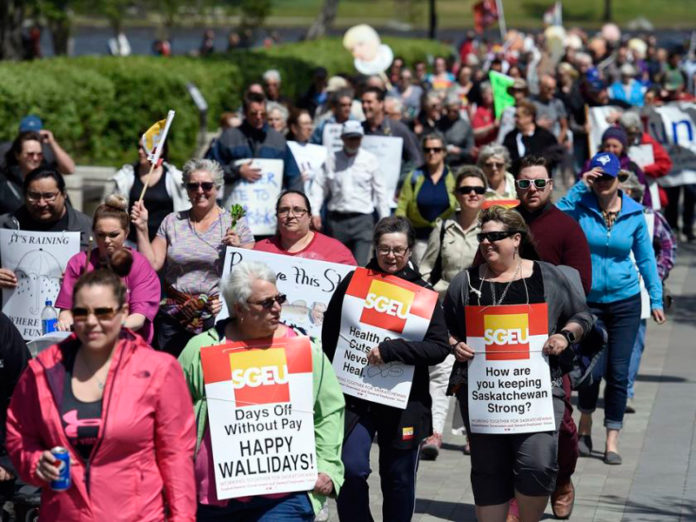Bargaining unit representing front-line employees has been without a collective agreement since 2016
The union representing about 12,000 front-line, provincial employees has received a strike mandate from its members.
Saskatchewan Government Employees Union (SGEU) announced the strike mandate Wednesday. While the union refused to release the actual numbers of the vote, union president Bob Bymoen said it was a strong strike mandate.
“We hope it brings the parties together and they can get to a collective agreement out of this,” Bymoen said.
‘The bargaining committee felt the government wasn’t taking (this) as seriously as they should, so we’re hoping now with a strike mandate the parties can get together, resolve their differences and get into a collective agreement.”
The members of the public service/government employment bargaining unit, which includes social workers, wildfire fighters, highway workers, lab technicians, agrologists, corrections officers and others, have been without a collective agreement since Sept. 30, 2016. Many of the members of the bargaining unit work less than full-time and are instead employed as part-time, casual, seasonal or term employees.
The two sides haven’t been at the bargaining table since a tentative deal reached in February was rejected in an April vote. The government was unwilling to negotiate further, prompting the SGEU to seek a strike mandate.
Bymoen said he’s hopeful it doesn’t come to that.
“It’s our goal always to negotiate a successful agreement,” he said. “A strike is one of the last options in our toolbox when it comes to bargaining.”
Negotiations have been ongoing since prior to the collective agreement expiring in 2016. Bymoen refused to comment on particular issues separating the two parties.
“W want to resolve it at the table, but they’re the standard sort of sticking points — wages, compensation and benefits,” he said.
“There is also some language in the agreement parts that govern the relationship. We’re hoping we can find our way through them.”
Bymoen confirmed that the government appears to have backed off from its demand that compensation fall by 3.5 per cent. That Brad Wall-era policy had been abandoned by the Scott Moe-led government in the last budget. Still, compensation is an issue.
“Our members have gone a significant length of time now without any kind of significant monetary increase, so there are still issues there,” Bymoen said.
While the union has a strike mandate, more work would have to be done before the workers could go on strike. One is to head back to the negotiating table, but Bymoen said the union and government would also have to finalize an essential services agreement before workers would be in a position to strike.
The Public Service Commision, the central human resources agency of the government, issued a short statement to the Herald in response to questions about the union’s decision and about continuing the negotiating process.
“We are aware that SGEU now has a strike mandate from their membership as a result of the recent strike vote,” a spokesperson wrote in an email, crediting the comments to the Government of Saskatchewan.
“We respect that this is part of the collective bargaining process. Our next steps include negotiating an essential services agreement. We continue to hope for a negotiated settlement.”
The lack of progress on negotiations concerns NDP Labour Relations Critic and Prince Albert Northcote MLA Nicole Rancourt.
“This is a big deal,” she said.
“These are really important frontline workers in our public service sectors. We know in Prince Albert that’s a large number of workers and services that are going to be impacted. “
Rancourt said she would like to see the government return to the negotiating table to work out a fair deal so the province doesn’t get to the point where it’s faced with a strike.
“I like to think the government will see the necessity of these workers,” she said.
“When we talk about essential services, I think all of the services provided by these front-line, government, public sector workers are essential. I’m really hopeful the government also sees that and


